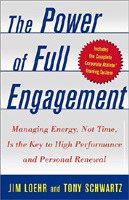 I am having some beach time, which always means some book time. As you would expect, I came with a prioritized stack. First was a book I have read on at least two other beach trips, but I have been a slow learner on this one. It is a book entitled, The Power of Full Engagement, by Jim Loehr and Tony Schwarz. Not only did I re-read it, I also read a follow-up work by one of the authors, The Power of Story. Both of the books are based on the premise that managing energy, not time is the key to high performance and personal renewal.
I am having some beach time, which always means some book time. As you would expect, I came with a prioritized stack. First was a book I have read on at least two other beach trips, but I have been a slow learner on this one. It is a book entitled, The Power of Full Engagement, by Jim Loehr and Tony Schwarz. Not only did I re-read it, I also read a follow-up work by one of the authors, The Power of Story. Both of the books are based on the premise that managing energy, not time is the key to high performance and personal renewal.
The “aha” moment in today’s reading came when I read “yet again” about the ineffectiveness of “multi-tasking.” We time management types have a difficult time believing we cannot do two or three things at a time without a significant loss of effectiveness. But the writer is clear and cutting in his analysis:
“The difference in depth between full engagement and multi-tasking is not incremental. It’s binary. Either you’re fully engaged or you are not.”
“Multi-tasking is the enemy of extraordinariness.”
“I believe that energy management is the answer to most individual health problems, which for most people requires a change in their story about physical energy. With that change will come an understanding that physical energy is actually one of the four dimensions of human energy, and that if the physical dimension fails, the other three fail, too; if the physical dimension fails, the other three fail, too; if the physical dimension flourishes, so can the other three.”
If this wasn’t enough, a recent New York Times article says that technological multi-tasking hinders the learning process hard-wired into our memories. Scientists working at the University of California, San Francisco discovered that rats whose brains were constantly stimulated did not create a persistent memory of their experiences. Theorizing that rats and people have neurological commonalities, they suggest that the same thing happens to humans.
Even my favorite devotional writer, Jim Denison, gets in the mix when he references a University of Michigan study, which found that people learned much better after walking in nature rather than walking in a city. It seems that you and I need downtime to let our brains solidify their experiences and turn them into permanent long-term memories. He concludes, “reading this essay while watching the news, listening to music and climbing on a Stairmaster may seem like an escape from the rat race, but rats would apparently disagree.”
So, my wife will be delighted to know that I am making a declaration against multi-tasking, unless … it involves multi-tasking my love for her! Can you tell I already miss her? See you next week.